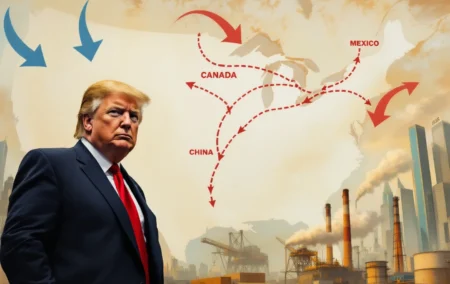We all like to hear fighting words from the targets of Trump’s tariffs, but counter-tariffs only make a bad situation worse.
Lately, we’ve had a lot of opportunity to discuss tariffs and whether they’re a good idea.
US president Donald Trump promises that tariffs will return America to an age of prosperity and greatness, will enrich US citizens because they’re paid by foreign countries, and will revitalise American industry, reduce prices, and bring quality manufacturing jobs back from overseas.
Since none of that is true on balance, that makes him either a liar, or an idiot, or both.
Deal-making
Those who support Donald Trump’s agenda and laud his self-proclaimed deal-making prowess think that despite their negative economic effect, trade tariffs, or the threat of tariffs serve as useful cudgels with which to beat countries that refuse to fall in line with American hegemony into submission.
To those people, I’d ask whether they like to negotiate with a gun against their head, and whether a “deal” is a good deal when it doesn’t benefit both parties to an agreement.
As if to underscore the contradiction in his own policies, Trump reportedly warned American automakers not to raise prices in response to tariffs. When questioned about this, he denied saying so, and instead said he couldn’t care less if they raised prices, and in fact, he hoped they would. (In fairness to Trump, he appears to have been confused about whether domestic car makers or foreign manufacturers were under discussion.)
Smoot-Hawley
Economists have centuries worth of data, not least from the disastrous Smoot-Hawley Tariff Act of 1930, which raised tariffs on some 20,000 imported goods to the second-highest level in US history (after the short-lived Tariff of Abominations of 1828), destroyed two thirds of global trade, deepened the Great Depression, and cost both Willis C. Hawley and Reed Smoot their legislative seats.
The Tax Foundation has also analysed previous tariffs imposed during Trump’s first term, and kept in place or raised during Joe Biden’s presidency, and noted that academic and governmental studies found the Trump-Biden tariffs “have raised prices and reduced output and employment, producing a net negative impact on the US economy”.
The data clearly shows that tariffs do more harm than good, and while tariffs do impact exporters in target countries, the bulk of their economic harm is inflicted on domestic consumers.
Tariffs routinely fail to achieve their stated goals, such as strengthening domestic industries, increasing domestic production, and creating more domestic jobs.
Tariffs universally raise consumer prices, starve industry of competitively priced imports, reduce the global competitiveness and efficiency of domestic companies, reward smuggling and corruption, and invite foreign retaliation.
They’re bad policy, period.
Retaliatory tariffs
This raises the question whether foreign retaliation to US tariffs is justified. Instinctively, a tit-for-tat response seems appropriate. We all like to hear fighting words from leaders like Canada’s prime minister, Mark Carney, who said they will take any and all measures necessary to protect their own economy from Trump’s assault, including imposing counter-tariffs.
Besides Canada, Mexico, the European Union, and China have all imposed or announced retaliatory tariffs. All are trying to hit the US where it hurts the most. All think they need to fight back.
The objective of counter-tariffs and other retaliatory measures is to convince the US to back down. With Trump’s on-again-off-again tariff policy, they might work in the short term. It’s impossible to predict anything when Trump is at the wheel – which is a major reason the markets are running scared.
Given that tariffs do more harm to domestic interests – both consumers and business – than to foreign exporters, the mere fact that the US imposes tariffs signals one of two things: either it is unaware that the economic pain will exceed any economic gain, or it is willing to accept the economic pain in order to achieve something other than economic gain.
Given, then, that retaliatory tariffs also do more harm to domestic interests than to US exporters, it is questionable whether the additional pain inflicted on the US economy will sway Trump from his course. (And that’s assuming that Trump is acting rationally. It is even harder to convince a swaggering narcissist with a fragile ego of the fact that he might have been wrong.)
Bad policy
If retaliatory tariffs are unlikely to change the course of American trade policy, and they inflict more harm on domestic consumers and importers than on US exporters, it stands to reason that retaliatory tariffs are bad policy.
They make a bad situation even worse.
That supports the argument I made earlier in the week, when I said that South Africa ought to drop its own tariffs unilaterally. Every country should drop tariffs unilaterally.
You tax things you want less of. Taxing trade reduces the benefits of trade, and reduces the prosperity and poverty relief that trade delivers.
Tariffs are bad policy not only on their own, but also when used as bargaining chips in trade negotiations, or as retaliation in trade wars.
If the US wants to return to an age of imperial mercantilism (and it does, as I wrote in December), the world should let it do so alone. The world shouldn’t follow the US off a cliff. The world should recommit to free global trade that doesn’t rely on the US, and refocus supply chains accordingly.
Retaliating in a trade war only does more harm. However tempting it might be to strike back with tariffs against US goods, it is bad policy, with negative consequences for a country’s own citizens.
Image: Illustration of Donald Trump’s tariff war by Traders Union. Used under a Create Commons licence.


